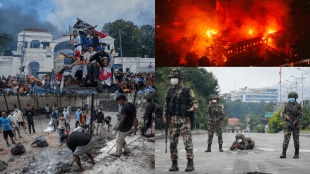All Stray Dogs Go to Heaven
Krishna Candeth
BluOne Ink
Pp 540, Rs 695
Somewhere in the middle of Krishna Candeth’s debut novel, All Stray Dogs Go to Heaven, is a sentence that holds together a menacing maze of memories that spill the beans on the nature of families. “If history is written by the winners, then that goes for family history too,” says a man. Another echoes his statement: “Yes, you are right, we see it all the time, the way the lies of one generation pass unquestioned on to the next. In the end, it’s not family history at all, it’s family politics.”
Candeth’s novel lays down the story of one family whose members work overtime to weave a daunting fabric of family history and family politics. Set in a family home in the panoramic Malabar region of Kerala, All Stray Dogs Go to Heaven strings together accounts of parents and their children, even friends, to create an unenviable arch of relationships. Waves of nostalgia feed the novel’s narrative that straddles the past and present in a socio-cultural mosaic of life and remembrance.
The novel begins with a quirky delivery of The Small Forest Book, an assortment of loose sheets in a blue binder to Nitya, the central character. The sheets contain texts of musings by Nitya’s friend Chinma during the many weeks both had spent wandering in the Western Ghats. The binder is left for Nitya after the passing of his friend. A death and delivery soon meander into uncharted territories. Characters tumble out of the pages as the book speeds on a bumpy road paved with a pang of homesickness.

The names of the characters are subtle: Pibi, Nitya’s father, Chiri, his first wife, Uncle Madi, Mbox or Matchbox, Hawk Knife, Elty, Yali and Inji. Headband Jalabalan is a long-distance swimmer who had miraculously survived when all of his family perished in a boat tragedy when he was one-and-half-year-old. Swami Isho, a 50-year-old holy man in saffron lungi and kurta with flowing hair, can drain his blood and seep it back. Jalabalan and Isho are faces that Nitya encounters on his many trips to his village in Malabar. Mbox, Hawk Knife, Elty and Yali are the sisters of Inji, Nitya’s mother.
The biggest character, it turns out, is Suvastu, the family home at the centre of a theatre of a family war. Everyone expected the house, which had rooms that looked out to a river and the jackfruit trees outside, to be passed on to Inji, who had arrived at Suvastu from Mumbai with her son after the death of her mother and wanted to live there. No one, however, knew Mbox was secretly preparing for a hostile takeover. The family politics spills into a carefully manicured courtyard and beyond, upsetting a fragile peace.
Candeth, who confesses in the preface to completing his first novel “at the tender age of seventy”, summons his multiple characters and the elements to create a magical universe of tales. There is a Malabar’s Monsoon Egg Eating Contest once won by a “morose doctor who stood in the winner’s circle with a loose garland of fifteen hard boiled eggs”. While visiting Suvastu from Mumbai as a nine-year-old, Nitya witnesses his first Theyyam performance where a figure in blinding red and orange vestments topped by a towering headdress asks the audience: “Proud Masters, what is your command? Monsoon Madness or Summer Lies.” “We need jobs!” shouts back a man from the audience. “Will the new communist government make some jobs come to light?” The response is swift: “If you let your minds out of the dark, the jobs will come!”
It is the minds, dark and otherwise, that the author draws his readers’ full attention. “A novel tells real or imagined stories of other people but how the mind gives form to and completes what it imagines is always a mystery,” Candeth writes in the novel’s preface. “There are so many visible and invisible elements—a web of correspondences, so to speak—that pervade and dictate the mood of that imagining,” he adds. In the end, it’s a web of family politics, both familiar and unknown. As one character says in the novel, the rise and fall of families and the rot and the decay of houses they lived in, were not set in motion by catastrophic events, but were the result of weak and short-sighted men in a hurry to seek material advantage. Another terms families as fickle and unscrupulous by nature. They would enforce a set of rules and etiquette to suit their actions and do away with them once their purpose had been served.
Faizal Khan is a freelancer









